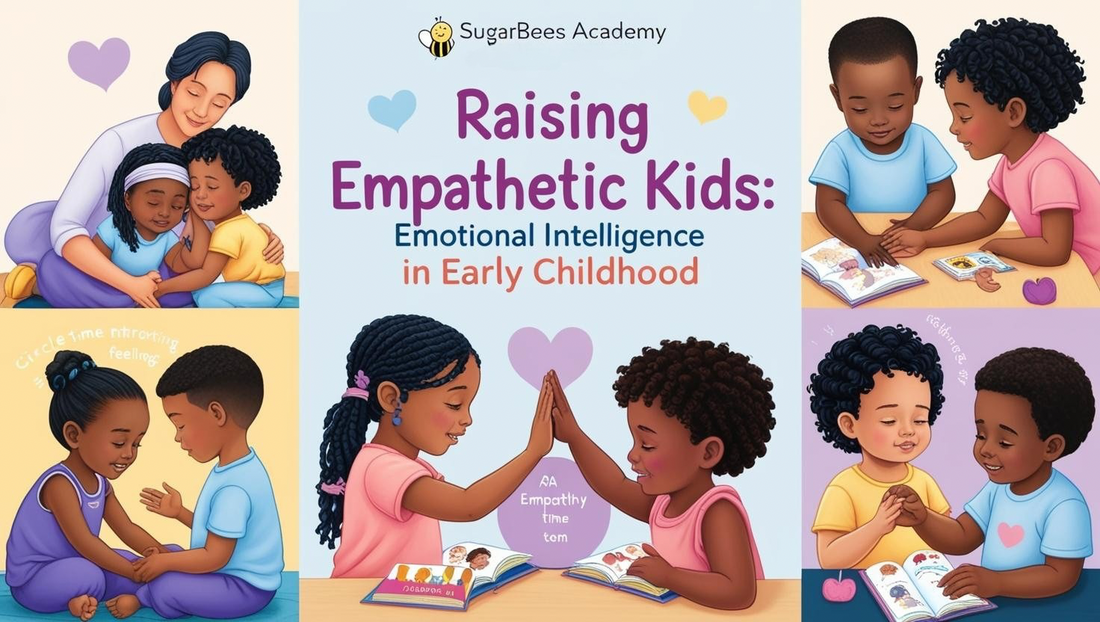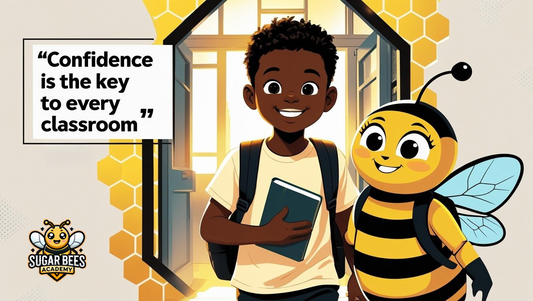
Raising Empathetic Kids: Emotional Intelligence in Early Childhood
Share
In today’s world, raising children who are kind, emotionally aware, and empathetic is more important than ever. At SugarBees Academy, we see empathy not just as a trait, but as a vital part of early learning—one that can be nurtured intentionally from a young age.
Empathy allows children to connect with others, understand feelings, and build meaningful relationships. It forms the heart of social and emotional development—and is central to our approach to early education.
⸻
What Is Emotional Intelligence?
Emotional intelligence (EQ) is the ability to recognize, understand, and manage our own emotions while also recognizing and responding to the emotions of others. It’s made up of:
• Self-awareness
• Self-regulation
• Empathy
• Social skills
Children who develop strong EQ tend to thrive academically, socially, and emotionally. They are more resilient, better problem-solvers, and more capable of forming healthy connections.
⸻
How Empathy Grows in Early Childhood
Young children are naturally empathetic—but like any skill, empathy needs nurturing. Here’s how we help develop it every day in our classrooms:
1. Labeling Emotions
We use everyday moments to help children recognize and name feelings. Instead of saying, “Stop crying,” we might say, “You’re feeling sad because you miss your parent. That’s okay.”
2. Modeling Empathy
Children learn by example. When educators or peers show kindness, take turns, or offer comfort, kids internalize that behavior.
3. Role-Playing & Storytelling
Through puppets, picture books, and imaginative play, children can explore different perspectives and develop emotional vocabulary—rooted in imagination.
⸻
The Role of Environment and Relationships
At SugarBees, we foster empathy through relationships and thoughtful community practices. Our classrooms are built around connection:
• Consistent routines build trust and security.
• Peace corners offer children a space to self-regulate or reflect.
• Group discussions give children a voice and help them listen to others.
We also encourage children to care for their environment and peers, teaching responsibility and compassion in age-appropriate ways.
⸻
How Parents Can Foster Emotional Intelligence at Home
As a parent, you’re your child’s most powerful role model. Here are ways to support their emotional growth:
1. Talk About Feelings Often
Use everyday language to identify emotions: “You look frustrated” or “That made you really happy, didn’t it?”
2. Practice Reflective Listening
When your child talks about their day, listen fully. Repeat back what they say to show you understand and validate their emotions.
3. Encourage Helping and Sharing
Let your child help with simple tasks at home or care for a pet. These acts reinforce that their actions affect others.
4. Read Books About Emotions
Stories are a wonderful way to explore empathy. Ask questions like: “How do you think she feels?” or “What would you do in that situation?”
⸻
Why Emotional Intelligence Is a Core Value
At SugarBees, emotional intelligence isn’t a side lesson—it’s woven into every interaction, routine, and story. We believe that when children are emotionally connected, they are better equipped to learn, collaborate, and thrive.
This commitment reflects our deep values: respect, connection, and lifelong growth. When we teach empathy early, we lay the foundation for a more compassionate future—one child at a time.
⸻
In Summary: Growing Hearts and Minds
Empathy isn’t just a soft skill—it’s a superpower. And it begins in the earliest years, through every conversation, act of kindness, and moment of connection.
At SugarBees Academy, we’re proud to nurture whole-child development, where emotional intelligence and community matter just as much as academics. Together, let’s raise a generation of children who care deeply, feel fully, and lead with heart.



